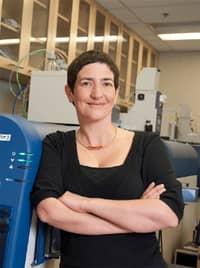
Gingras laboratory
We are a signal transduction, systems biology and proteomics lab located at the Lunenfeld-Tanenbaum Research Institute (LTRI) in Toronto.


Dr. Anne-Claude Gingras
Dr. Anne-Claude Gingras is a Senior Investigator at the LTRI and Professor in the Department of Molecular Genetics, University of Toronto. Dr. Gingras is an expert in mass spectrometry-based proteomics, a technology that enables the identification and quantification of proteins from biological samples. Her lab specializes in developing tools to better understand how proteins associate with one another to perform their functions.
Latest news
A new version of ProHits-viz is released
We have just released a new version of our data visualization suite ProHits-viz, including a new interface, more interactive features, a new analysis tool, detailed online help and a number of tutorial videos. Check out our Twitter thread for more details on the changes.
New paper on TurboID-mediated BioID in zebrafish
Our new paper by Shimon Rosenthal (with Ian Scott) describes protocols for TurboID-mediated proximity-dependent biotinylation in zebrafish embryos using either mRNA injections or inducible transgenics.
The human cell map is published at Nature
Our study illuminating the organization of a live human cell through proximity-dependent biotinylation (BioID) profiling of 192 markers is now online at Nature, and the website is live at humancellmap.org.
Research
Enabling tools for proteomics
Our laboratory aims to continuously improve interaction proteomics through the development of experimental and computational approaches. These include optimized protocols for affinity purifcation and BioID, and tools for mass spectrometry analysis, data management and visualization.
Read moreSystems biology
At the systems level we have studied and continue to perform large-scale projects on protein families, such as phosphatases, kinases, bromodomain-containing proteins and chaperones. We have undertaken organelle-specific studies of RNA bodies, the mitochondria and nuclear bodies, and even a broader project to map the localization of all proteins in the cell. We also have members tackling broad studies on several cell regulatory mechanisms, including somatic cell reprogramming and splicing. These projects utilize a variety of techniques, but in large part are pursued through interaction proteomics.
Read moreSignalling
Some of our core research interests have been the study of signaling pathways that are deregulated in cancers and rare diseases. These include mTORC1 activation, receptor tyrosine kinase signalling, the STRIPAK phosphatase and kinase complex (implicated in CCM disease) and the Hippo pathway, between the last two of which we interestingly discovered novel and important connections.
Read moreCOVID-19
When the COVID-19 pandemic began in 2020, the lab quickly shifted some attention and resources to aid in the global research effort. We began studying the interactome and life cycle of the SARS-CoV-2 virus in infected cells, while also developing assays for the detection of serum and plasma antibodies that block the interaction of the virus with host cell receptors.
Read more